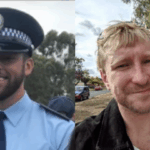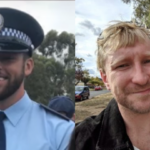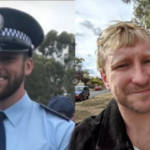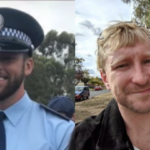A Malicious Abuse of Police Powers: ISUEPOLICE’s Luke Brett Moore on His Suing Police Trifecta
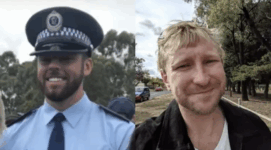
The hearing of the cost application relating to the malicious prosecution case that Luke Brett Moore launched against the state of NSW has been handed down, and the court stipulated that the state must pay 88 percent of the law graduate and strip search activist’s court costs, which means that the $450,000 he was awarded in damages will actually serve to compensate him as a victim of police.
Moore took the state to the cleaners, after NSW police constable Daniel Keneally in February 2021, hung up the phone whilst on duty at Newtown police station, after speaking to Moore and promptly falsely accused him of threatening the life of a Goulburn detective. Moore was making a complaint to the station about the NSW police strip search policy and the constable’s reaction cost all dearly.
Despite Moore having made no threats about any detective over the phone – indeed, he didn’t even mention the man’s name – detectives from the NSW police Fixated Persons Investigation Unit turned up at his Nowra premises the following day and hauled him into the station to charge him, then deny him bail and remand him in solitary confinement for 22 days.
The only reason that Moore was able to escape potential imprisonment over the false claim that he’d threatened the life of a Goulburn police detective was that he’d recorded the call on his phone. So, for the entire time that the innocent man was stewing away in a NSW correctional facility, the evidence as to his innocence was locked away in a Corrective Services NSW storage room.
The suing police hattrick
This is the third time that Moore has successfully sued police. However, as NSW Supreme Court Justice Richard Cavanagh pointed out, Moore has been harassed by officers of the force for at least the last decade. So, in order to achieve his suing police trifecta, the Nowra man has had to endure three incidents in which NSW police officers abused their powers to negatively impact him.
Justice Cavanagh ruled in Moore’s favour on 12 September 2025, to award him $450,000 in damages. However, as Moore explained he was not certain that he had been adequately compensated for his traumatisation, as the hearing regarding who would pay the court costs was pending, and if he’d been unsuccessful, his damages could have gone towards paying the state’s costs.
The 17 October 2025 ruling on costings was in Moore’s favour, however, with Justice Cavanagh finding that the state of NSW had to pay 88 percent of his costs. Moore further explained that this was a significant ruling on costings, as the state’s legals managed to fumble its submission.
Sydney Criminal Lawyers spoke to Luke Brett Moore of ISUEPOLICE.com about how it feels to have come out the other end of this process that saw him spend 22 days in isolation based on fabricated evidence, the reasons why the ruling on costings was so significant, and how he’s please to finally be able to move ahead with his legal service that assists others in taking legal action against police.
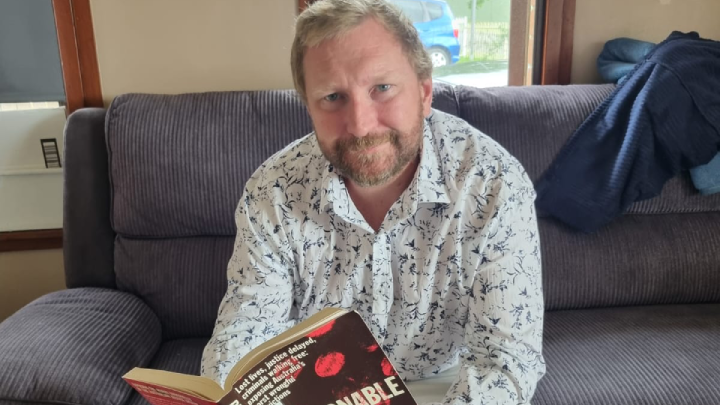
In September, Justice Richard Cavanagh ruled in your favour in a civil suit that involved suing the state of NSW over malicious prosecution, after then NSW police constable Daniel Keneally made a false statement about you having called Newtown police station and, after getting him on the line, threatening to kill a Goulburn police detective.
This led to your being illegitimately held in solitary confinement for 22 days. You were awarded $450,000 in damages due to this, and a subsequent costings hearing was in your favour.
Luke, how are you feeling about the outcome of the case? Would you say you’ve been adequately compensated in order to make up for the treatment you received?
I’m relieved it is over, more than anything. It has been a long fight. This thing started five years ago. As far as the compensation is concerned, I did three weeks in custody, so you could consider that I will end up with $100,000 for each week I was in custody.
Unfortunately, it doesn’t really work out like that, because, ultimately, this delayed the start of my own business by almost five years, while having to wait for these proceedings to finalise.
So, I couldn’t move forward with ISUEPOLICE.com, and no amount of money will ever make up for that.
Justice Cavanagh’s decision was fair and well-reasoned, although I would obviously have liked more.
Everybody who goes through what I went through would like more. As far as whether I agree with him on all points, his decision was fair and well-reasoned.
Was the psychological impact of being locked up in solitary confinement when you hadn’t even committed a crime a major factor in the ruling?
Unfortunately, on that point, Justice Cavanagh did not agree. We were trying to say that the time in solitary confinement caused me long-term psychiatric harm, which if we got up on that point, would have upped my damages by $500,000 or more.
People don’t understand the long-term effects of a person being wrongfully incarcerated. Anyone who has experienced it would know that it stays with you for life. There are no two ways about it.
If you’ve ever been wrongfully incarcerated, or even wrongfully accused of a crime, it’s something that does take a heavy toll on you and that part of Justice Cavanagh’s judgement could have gone the other way in my favour, but unfortunately, we didn’t get up on that point.
Justice Cavanagh awarded you $450,000 in damages. Whilst this appeared a sizable amount, the costings hearing was pending. That hearing resulted in the state having to pay 88 percent of your court costs, which means that the civil suit was worthwhile.
The finding on costs was significant in terms of how the ruling was made. So, can you explain why the ruling on costs was so important?
Effectively, the state did offer $480,000 about a year ago. They were arguing that because I didn’t beat that offer, I should not be entitled to any costs, and I should pay their costs as well.
Fortunately for me, unfortunately for them, they didn’t use the correct words in their offer, so, effectively, it was not valid. That is why we ended up winning on the costs argument.
The specific wording of their offer failed to include the words either ‘judgement for the plaintiff’ or ‘exclusive of costs’. Now, if they had of put either of those phrases in their offer, the cost decision would almost certainly have gone their way, which would have left me with nothing.
Why they forgot or chose not to include those words in the offer, is up for debate. But what I will say is, I offered to settle the matter for $360,000 at the end of 2021.
So, before I even lodged proceedings, I offered to walk away for $360,000 and they rejected it. So, instead of paying me $360,000 and calling it quits, the state ended up having to pay me $450,000, pay my lawyers more than $1 million and the state’s legal fees are over $200,000.
This effectively cost them $2 million, when it could have cost them $360,000, and it would have saved them a lot of embarrassment.
Nice.
Yeah, I offered to settle for $360,000 in November 2021, and they would not go up past $170,000, which was just a ludicrous offer to expect to me to accept. They knocked back the $360,000 and it went to 2 mil.
But as I said, the five years delay to my business – my lawyers made $1 million out of this – so you can consider how much I could have potentially made doing this for other people for the last four or five years.
I do wonder if the same bureaucrats and lawyers that told them to knock back the $360,000, were also the same ones who forgot to put three or four words in the offer, which ended up costing almost $2 million.
It wasn’t too hard to find out whether their offer was valid or not, I might add, because you could run it through ChatGPT, and it would tell you that it was not a valid offer.
So, they have all these lawyers working on it and if they had just put it through ChatGPT and asked if it was valid, it would have told them no because it fails to include proper orders and an amount for costs.
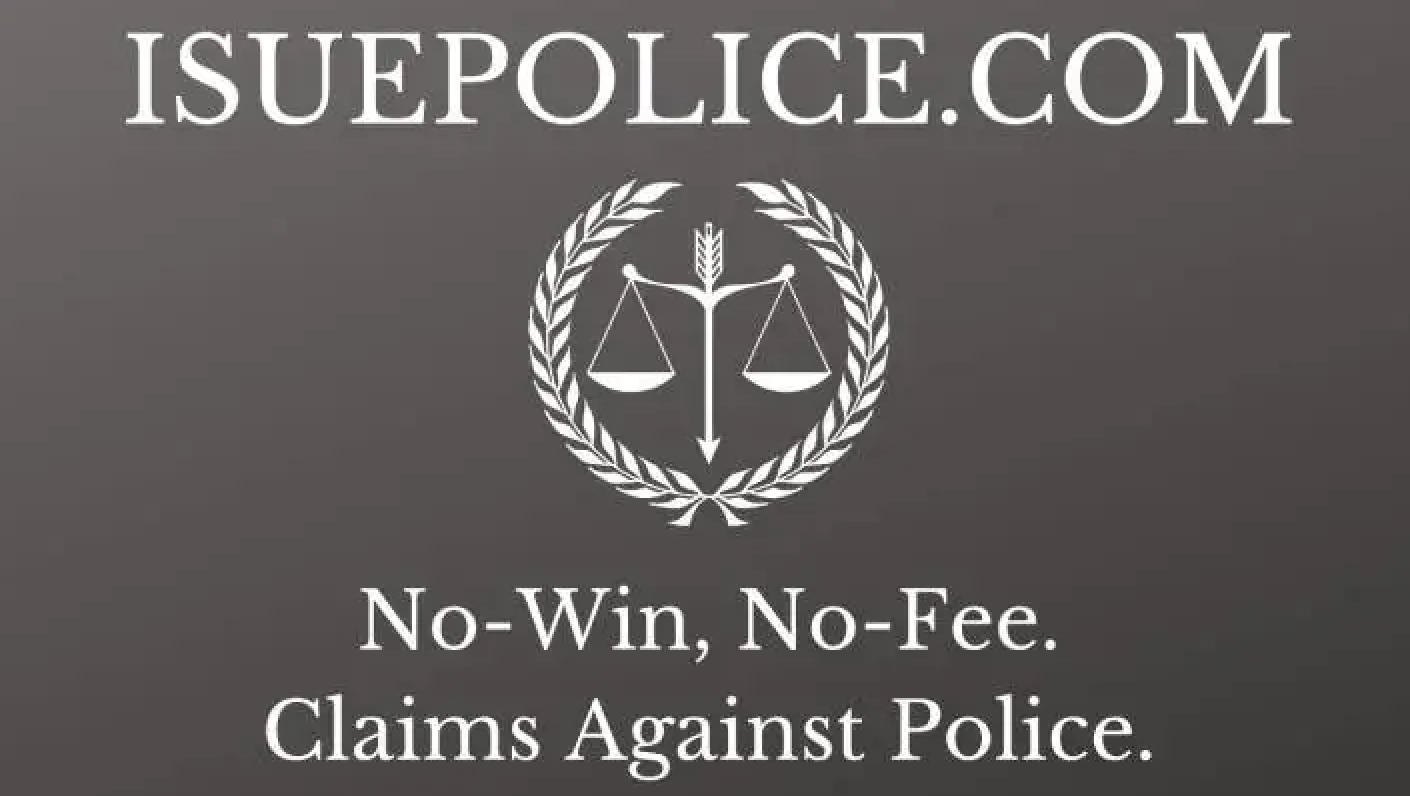
So, you’re now going to move ahead with your business ISUEPOLICE.com.
I am waiting for the money to hit my account, which will put me in a position to fund a full-time lawyer to help me, and we should start taking cases immediately in the new year.
What will those cases involve?
Unfortunately, not much has changed with NSW police over the last five years. Obviously, it has been a delay to my career. They are still unlawfully strip searching people, however. They are still maliciously prosecuting people.
NSW police are still making up allegations about people that aren’t true, and officers are still using excessive force on people on a daily basis.
There is certainly no shortage of people who have been abused or mistreated by police, so I expect that there will be no shortage of clients when I finally move ahead with my work with ISUEPOLICE.com.
As noted, you were held in solitary confinement for 22 days on the false accusation of a police constable having lied about what you said on the phone.
The reason you were able to prove that you’d been falsely accused is that you had recorded the conversation on your phone. So, the whole time you were in prison, the proof of your innocence was on the confiscated phone.
What do you consider would have happened to you if you hadn’t recorded the call?
It’s likely I would have been convicted. In fact, in Daniel Kenneally’s criminal matter, the judge said that if it was not for the recording, not only would he have gotten away with what he did, but I would have almost certainly been convicted over threatening a police officer’s life.
Almost immediately after the call, he was making these allegations. A judge would have likely sided with him in any criminal trial against me. I would have likely been convicted and done a year or two, potentially more, if I had not recorded the conversation.
And you’ve explained in the past that the NSW police continued to contemplate prosecuting you after you’d ensured that officers were aware of the recording?
That is what Justice Cavanagh found in his judgement. There was also another detective, detective Malcolm Felgate, who effectively not only covered up for Daniel Kenneally’s wrongdoing, but he was found by Justice Cavanagh to have maliciously prosecuted me in circumstances where he knew I didn’t make the threats.
Felgate continued to prepare documentation reflecting that I had committed the crime, and he even told other police that I’d been making threats to other police officers, while he admitted on the stand that he knew at the time that it was not true.
Unfortunately, the Law Enforcement Conduct Commission has failed to do anything in respect of Felgate at this stage but given the judgement that certainly warrants review.
As far as I am concerned, a finding of malicious prosecution is effectively a finding of perverting the course of justice at least to the civil standard. That certainly should open the door to whether a criminal offence was committed by this other detective.
At the time you were falsely accused and had the NSW Fixated Persons Investigation Unit turn up at your house, you’d had past experience in dealing with the NSW police. In fact, your phone call to Newtown police station involved a complaint about the NSW police strip search policy, of which you’ve fallen foul of in the past.
So, do you consider what occurred to you to be a one-off, or do you think there might be other cases like yours?
This certainly was not a one-off for me or other people. I have been dealing with the police and false allegations for more than a decade now, and I am well versed in their procedures and the way that they do things, and the way they cover up things.
I had that conversation recorded and still barely managed to get out ahead at all. So, certainly, for someone without the experience and the knowledge, it’s difficult. I know, I speak to people all the time who have suffered injustices at the hands of police.
It is not just one bad egg or a one-off incident. This is people throughout NSW, right across Australia and throughout other countries. Police abuse their powers at times and at times, they do it maliciously.
You can look at the strip search class action that just happened. The judge found that thousands of plaintiffs had been unlawfully strip searched at festivals. It was a systemic problem, and it has been with NSW police for a long time.
I suspect these problems will always continue.
And lastly, Luke, this is your third time having successfully sued the state over the actions of NSW police. However, that also means you’ve been in a situation on three occasions that involved NSW police officers overstepping the mark when dealing with you.
The NSW Supreme Court Justice noted that you have been harassed by the NSW police for the last 10 years. So, do you consider you might be up for a fourth round in court?
That is an interesting question. To be honest, I hope not. Despite receiving hundreds of thousands of dollars in compensation, it’s still certainly taking its toll on me, my family and everything.
I hope nothing personal happens to me or anyone. But at least now with this compensation, I’ll be in a position to help others moving forward.


